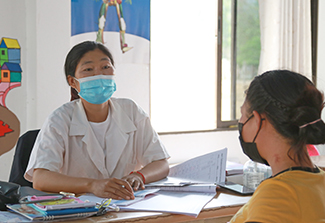NIH hosts symposium on emerging topics in global health
July/August 2023 | Volume 22 Number 4
 Photo courtesy of the U.S. Department of State The melting of ice and permafrost in the Artic is transporting parasites south to susceptible populations with no pre-existing immunity, including mammals.
Photo courtesy of the U.S. Department of State The melting of ice and permafrost in the Artic is transporting parasites south to susceptible populations with no pre-existing immunity, including mammals.
NIH recently hosted the "Emerging Topics in Global Health" symposium, sponsored by the Global Health Interest Group. Topics included health equity, and advances in health technology in the context of global health research. The interest group is supported by the NCI Cancer Prevention Fellowship Program.
How the Big Thaw impacts infectious disease
Our planet’s north is heating up twice as fast as the rest of the globe, causing permafrost—the frozen soil covering a quarter of the northern hemisphere—to thaw. Yet ice is an important ecological barrier that limits pathogen spread from old hosts to new. The ongoing reduction in Arctic ice, along with warmer temperatures, increased human activity (such as drilling) in the north, and expanding marine mammal ranges—a species “range” is the area across which the group routinely migrates and hibernates—all contribute to changes in infectious disease distribution and risks
Proof of this danger is the increased number of marine mammals found stranded and sick with protozoal disease, noted Dr. Michael Grigg, chief of the Molecular Parasitology Section at the National Institute of Allergy and Infectious Diseases, in his presentation.
Scientists estimate 40% to 90% of marine mammals currently carry protozoal disease and many of these infections are oocyst-transmitted. Oocysts, a hardy spore containing a fertilized cell (representing one stage in the life cycle of parasites), can survive in water for long periods. The melting of ice and permafrost will transport these microbes to bays and estuaries, where mollusks (or other invertebrates) might become infected and, in turn, infect their predators.
“Expansion of Arctic parasites south to susceptible populations with no pre-existing immunity is an inevitability,” said Grigg.
For example, the geographic range of Arctic ringed seals, in which
Sarcocystis pinnipedi, a genus of protozoan parasites, are prevalent, now overlaps with that of gray seals. In March 2012, more than 400 gray seals died when a Sarcocystis species spread a fatal form of hepatitis among them. Similarly,
Sarcocystis lutrae, which is seen in Arctic foxes, has begun “moving south” where it’s begun to infect northern sea otters in Alaska (causing encephalitis) and subarctic terrestrial and marine mammals, including mink and martens.
Just as some parasites are migrating south (where they infect previously unexposed populations), others are heading north, noted Grigg. Toxoplasma gondii, the parasitic protozoan found in undercooked meat and cat feces, is ubiquitous at lower latitudes, and many mammals and people carry it with no ill effects. Yet it has been identified in Arctic beluga, a traditional food source of the Inuit people, posing a danger to pregnant women and individuals with weak immune systems.
 Photo courtesy of ILO Asia-PacificA patient speaks with her doctor at a hospital in the Lao PDR. A recent study showed significant associations between socioeconomic status and health-related quality of life in that country.
Photo courtesy of ILO Asia-PacificA patient speaks with her doctor at a hospital in the Lao PDR. A recent study showed significant associations between socioeconomic status and health-related quality of life in that country.
Quality of life among cancer patients in Lao People’s Democratic Republic
Lao People’s Democratic Republic (PDR), which is populated by nearly 8 million people in an area roughly twice the size of Pennsylvania, has one of the fastest growing economies in the world. Cancer cases in Lao People’s Democratic Republic (PDR) have doubled over the past two decades. By 2040, scientists predict that 11,800 people will die from the disease—a 90% increase over 2020’s cancer fatalities. A cancer diagnosis can impact each patient’s health-related quality of life in a variety of ways.
Dr. Lena Lee, an intramural scientist at the NIH Clinical Center, presented on an observational study of 193 cancer patients who visited one of two hospitals in the capital, Vientiane, early in 2022. Study participants responded to questionnaire and survey questions measuring health-related quality of life. Lee and her research team discovered a high proportion of patients with impaired functioning (54% to 93%) and high levels of symptoms (27% to 83%).
A diagnosis of advanced-staged disease and a lack of well-resourced health facilities were major contributors to poor health-related quality of life, Lee and her colleagues found. More than a quarter (26%) of patients were not receiving cancer treatment either because of facility-related factors, such as a lack of trained providers, a shortage of medication, and high treatment costs, or patient-related factors, such as costs for transportation, care, and drugs. In fact, 87% of patients experienced financial difficulties due to loss of income and the added expenditures related to illness. Overall, the study showed significant associations between socioeconomic status and health-related quality of life.
Lee proposes developing and implementing health equity policies, such as increasing the accessibility and availability of healthcare services. She also recommends financial support for poor patients to reduce their out-of-pocket expenses. Implementation of guidelines to improve symptom management is also needed in addition to increased awareness of cancer treatment (and its side effects) among patients and within communities
Research during crisis
Humanitarian crises, which can include natural disasters, disease outbreaks, armed conflict, and forced displacement, currently affect hundreds of millions of people worldwide. The toll on individual and community health is immense; crises often leads to malnutrition, infectious disease outbreaks, trauma and injury, and both short- and long-term impacts on health.
In a poster session, Fogarty senior scientist Dr. Amit Mistry explained that key research questions can only be addressed in active crisis settings. Fogarty’s
Center for Global Health Studies aims to catalyze high-quality, ethical, and actionable research conducted while disasters and displacement occur. The
Advancing Health Research in Humanitarian Crises project also seeks to strengthen scientific capacity, especially in low- and middle-income countries (LMICs), for health research conducted in crisis settings.
The project argues that health research throughout the stages of a crisis is integral to improving our ability to respond to future crises. Researchers in this field may be interested in questions such as : How do social, psychological, and biological factors contribute to the resilience of Ukrainian children? How should existing mental health interventions be adapted for refugee camps? How do environmental exposures from wildfires affect health? How effective is an Ebola vaccine during an outbreak in remote, conflict-affected settings?
The Fogarty project has assembled 23 case studies describing how researchers have addressed challenges in the field. The studies identify effective strategies to deal with methodological limitations, ethical issues, and security and logistical concerns. Strategies often involve flexible methods, engagement with local communities, and partnerships with humanitarian actors.
In November 2021, the project convened more than 80 researchers — most early- and mid- career scientists from LMICs — NGO staff, and various funders for a pilot meeting of the Global Forum on Humanitarian Health Research, which featured research presentations, breakout discussions, and “Meet the Expert” sessions. A second meeting with in-person and virtual sessions is planned for 2024.
More information
Updated August 15, 2023
To view Adobe PDF files,
download current, free accessible plug-ins from Adobe's website.
Related Global Health Research Topics